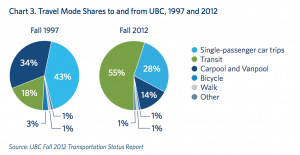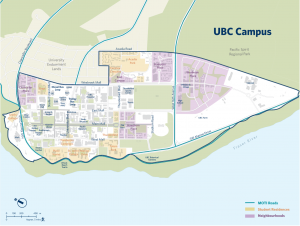UBC’ s Transportation Plan
Since 1997 there have been significant changes to UBC’s Transportation plan. UBC’s aim is to promote a healthy environment by cutting the pollution caused by driving to UBC. To promote this initiative, UBC has effectively cut down on the number of people who drive to campus by providing students with U-Pass which is a bus pass that is subsidized for students and covers all three zones as well as sea buses and sky trains.
While UBC has been successful in depleting the amount of cars that come with single drivers to the campus (car pooling is encouraged), the goal is to have at least two thirds of UBC’s population to either walk, car pool or transit to the campus by the year 2040.

As a new student, while this initiative is brilliant and the idea of paying only $41 for a bus pass that non students pay $99 for, for one zone, encourages one to use the transit to come to campus. However, while initiatives may be effective, as a new student, and as someone who is new to British Columbia, I found it challenging to find accommodation within my price range within close proximity to the campus, forcing me to rent a place in Burnaby- a city close to Vancouver. As a new student I think it would have been convenient for me to use the bus/ sky train had I been lodging in Vancouver, however, as per my personal experience, the living cost decreases as you move towards the East of the campus. Cities such as Burnaby, Coquitlam and Surrey offer accommodation for lower monthly rent than areas within Vancouver that are within proximity of the campus. This makes using transit challenging as the commute becomes three to five hours long (round trip).
Keeping the living cost in mind, if one lives closer to campus it would be possible to cycle to the campus however, because the U-Pass is mandatory to purchase and is a part of the students’ tuition fee. Therefore, it may not be beneficial to be in such close proximity to the campus where one will be required to walk or cycle to the campus as they are being charged for the bus pass anyway. There is an option to opt out of the U-Pass so that is something that is a resource for students.
UBC campus offers a lot of retail options and has all basic amenity stores within walking distance. However, as a new student I have rarely ever used those amenities mostly because I am a commuting student. As a commuting student, getting ton class in time is sometimes a struggle therefore, coming to campus early to use the amenities is not a priority and if I intend to use them after the end of my classes for the day, the stores have mostly closed. Therefore, while the campus ensures students have access to services, it may only be most beneficial to students living on or close to campus.
The transportation plan, in my opinion, has a drawback. In the winters, most students wouldn’t prefer to use transit. Therefore, while the goal to have 2/3 of the campus using transit by 2040 is achievable, but it seems the goal did not take into account the weather changes. Nonetheless, the initiative has already been successful and has been effective.
